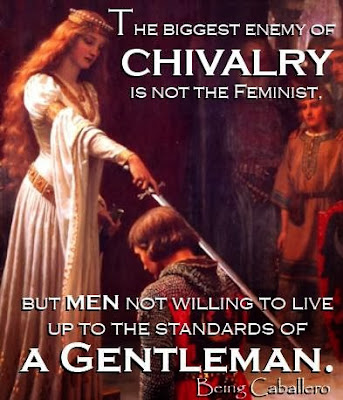Winston
Churchill
Every once in a while, someone
throws the “Chivalry is dead” phrase in the middle of a debate. Although we
have discussed the importance of Chivalry and being a Gentleman numerous times,
especially since that is the main topic of this entire blog, I think an article
was due as to why chivalry can’t die. I am not talking about why it shouldn’t
die, but why it literally cannot die.
Evolution and Change.
The latest fad of “Chivalry is dead”
comes from the Men’s Liberation Movement. They condemn Chivalry as a way for
women to keep men under their rule. That’s ironic because in the 70’s, the
Women’s Liberation Movement said pretty much the same thing, but about men. And
these have not been the first times that Chivalry and Gentlemanly behavior has
been condemned. But to understand that, we need to understand some basic
concepts about both, Chivalry and Gentlemen.
Most people understand that Chivalry
was the code of honor Medieval Knights had and protecting women was an integral
part of it. But what most people ignore is Chivalry is simply an evolution of
the code of conduct maintained by Roman Centurions. Most of the Gentlemanly
concepts can be traced back to the Moral Codes established by leaders like
Marcus Aurelius. More so, similar codes of conduct are found all over the world
and throughout history.
Chivalry originated from Chevalier,
"horseman” or “knight". The term evolved over time, from the original
military concept of a simple Cavalry to the ideals of the Christian Warrior
Ethos. A similar evolution happened with Gentleman. Originating from the term
“well-born man”, a Gentleman was the noble rank between a Yeoman, a peasant who
owned land, and an Esquire, the lowest rank in the process to becoming a
knight. As knighthood faded with the medieval age, gentleman became the general
term for all nobility, and later for men who demonstrated proper behavior
because of their noble bloodline.
 And there is where we first start
hearing the term “Chivalry is Dead”. As Knighthood faded, and the commoners
started to acquire riches and powers similar to those of the Nobles, Chivalry
was viewed by some as a way for Nobles to maintain power. The commoners started
adopting the term Gentlemen, removing its relationship to Noble Bloodlines.
And there is where we first start
hearing the term “Chivalry is Dead”. As Knighthood faded, and the commoners
started to acquire riches and powers similar to those of the Nobles, Chivalry
was viewed by some as a way for Nobles to maintain power. The commoners started
adopting the term Gentlemen, removing its relationship to Noble Bloodlines.
But the military codes of conduct
remained. Because at its core, chivalry is nothing more than a quest to become
a better man. It is a way to maintain self-discipline and forge order in a
chaotic world. Sure, we might try to remove the word “Chivalry” to avoid
offending others. And they have. Cavaliering and Gallantry have been used at
one time or another. But the reality that both are nothing more than just
synonyms to Chivalry.
So every time I hear someone say the
phrase “Chivalry is Dead” it tells me more about their misunderstanding of the
concept than it does about Chivalry actually being dead. Because chivalry, as
so many other concepts, is not cast in stone. It evolves and changes as
required to ensure we become better men.


No comments:
Post a Comment